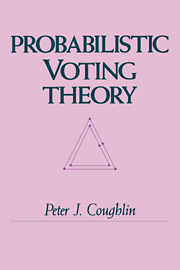Book contents
- Frontmatter
- Contents
- Acknowledgments
- 1 Majority rule and models of elections
- 2 Income redistribution and electoral equilibria
- 3 Properties of the redistributional equilibria
- 4 A more general election model
- 5 Concave social and candidate objective functions
- 6 Directional, stationary, and global electoral equilibria
- 7 Epilogue
- References
- Index
7 - Epilogue
Published online by Cambridge University Press: 05 November 2011
- Frontmatter
- Contents
- Acknowledgments
- 1 Majority rule and models of elections
- 2 Income redistribution and electoral equilibria
- 3 Properties of the redistributional equilibria
- 4 A more general election model
- 5 Concave social and candidate objective functions
- 6 Directional, stationary, and global electoral equilibria
- 7 Epilogue
- References
- Index
Summary
My objective here is to step back from the detailed analyses in Chapters 2–6 and provide a useful perspective on what was accomplished. Specifically, I discuss the broad significance of the results that have been established, focusing on (i) the existence of political equilibria, (ii) the maximization of implicit social welfare functions by these equilibria, (iii) normative interpretations of the implicit social welfare maxima, and (iv) this book's potential for providing the basis for future applications of election models.
Political equilibria
Stigler (1975, pp. 138–9; 1983, pp. 262–4), Peltzman (1976,1980), Becker (1983, 1985), and scholars who have applied their models of the public sector, such as Roberts (1984, 1985) and Godek (1985, 1986), have had faith that political equilibria exist. They have therefore simply assumed that a political equilibrium exists, even though, in their analyses, they have neither referred to any existing models nor specified any new models from which this important assumption can be derived.
The election models with abstentions that have been developed by Hinich, Ordeshook, and others (discussed in Section 1.5) are multidimensional models in which equilibrium existence results have previously been derived. The role that abstentions played in the derivation of existence results for these models was described by Hinich et al. (1972) as follows: “We show… that if citizens abstain in a prescribed manner, an electoral equilibrium exists… Thus, abstentions yield a majority choice” (p. 145).
- Type
- Chapter
- Information
- Probabilistic Voting Theory , pp. 220 - 226Publisher: Cambridge University PressPrint publication year: 1992



